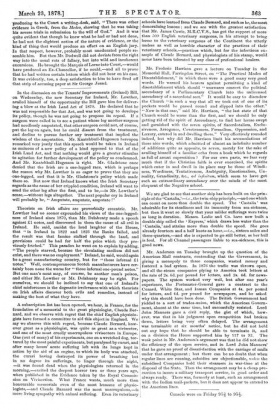Mr. Anderson on Tuesday brought up the question of the
American Mail contracts, contending that the Government, in giving a monopoly to three companies, wasted money and fostered a bad system. In 1876 the traffic was thrown open, and all the steam companies plying to America took letters at the rate of 2s. 6d. per pound for letters, and 2s. 4d. for news- papers. The system worked very well, but after one year's experience, the Postmaster-General gave a contract to the Cunard, White Star, and Inman Companies at 4s. per pound for letters, and 4d. per pound for newspapers, and ho asked why this should have been done. The British Government had yielded to a sort of trades-union, which the American Govern- ment, almost at the same time, had successfully resisted. Lord John Manners gave a civil reply, the gist of which, how- ever, was that in his judgment open competition had broken down, letters being very often delayed. The arrangement was terminable at six months' notice, but he did not hold out any hope that he should be able to terminate it, and on a division the House supported him by 117 to 92. The weak point in Mr. Anderson's argument was that he did not show the efficiency of the open service, and in Lord John Manners' that he gave no proof of dissatisfaction with the carriage of mails under that arrangement ; but there can be no doubt that when regular lines are running, subsidies are objectionable, unless the subsidised Companies hold their steamers -in war-time at the disposal of the State. Then the arrangement may be a cheap pre- caution to insure a military transport service, in good order and always ready. There was, formerly at least, such an arrangement with the Indian mail-packets, but it does not appear to extend to the American lines.


































 Previous page
Previous page